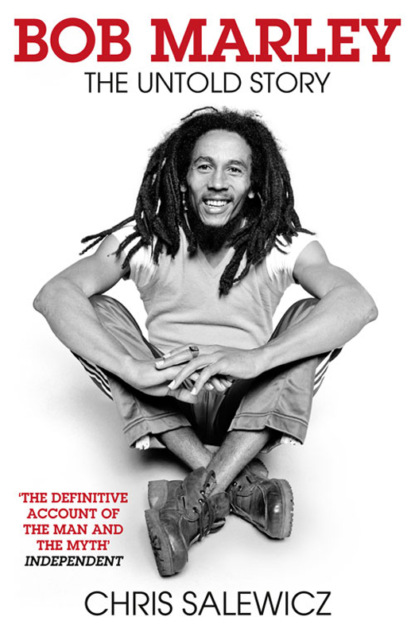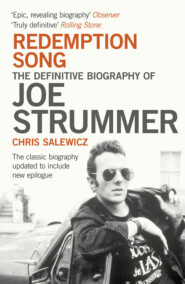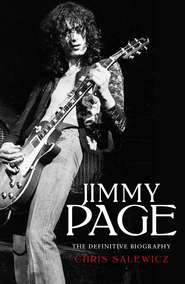По всем вопросам обращайтесь на: info@litportal.ru
(©) 2003-2024.
✖
Bob Marley: The Untold Story
Настройки чтения
Размер шрифта
Высота строк
Поля
Bob Marley: The Untold Story
Chris Salewicz
What was it about Bob Marley that made him so popular in a world dominated by rock’n’roll?How is that he has not only remained the single most successful reggae artist ever, but has also become a shining beacon of radicalism and peace to generation after generation of fans across the globe?On May 11, 1981, a little after 11.30 in the morning, Bob Marley died. The man who introduced reggae to a worldwide audience, in his own lifetime he had already become a hero figure in the classic mythological sense. From immensely humble beginnings and with talent and religious belief his only weapons, the Jamaican recording artist applied himself with unstinting perseverance to spreading his prophetic musical message.And he had achieved it: only a year earlier, Bob Marley and The Wailers' tour of Europe had seen them perform to the largest audiences a musical act had up to that point experienced. Record sales of Marley's albums before his death were spectacular; in the years since his death they have become phenomenal, as each new generation discovers afresh the remarkable power of his music.Chris Salewicz, who had a sequence of adventures with Bob Marley in Jamaica in 1979, offers us a comprehensive and detailed account of Bob Marley's life and the world in which he grew up and came to dominate. Never-before-heard interviews with dozens of people who knew Marley are woven through a narrative that brings to life not only the Rastafari religion and the musical scene in Jamaica, but also the spirit of the man himself.
BOB MARLEYTHE UNTOLD STORY
CHRIS SALEWICZ
Dedication (#ulink_8fa58c33-e316-575e-8d6c-88a1414170e5)
For Dickie Jobson (14 November 1941–25 December 2008)
and Rob Partridge (2 June 1948–26 November 2008)
Contents
Cover (#ub48ce4eb-4432-5b09-95f6-01c36ab82d1f)
Title Page (#ue8e3ee82-dc72-52d1-8314-c89bb6e7ffa2)
Dedication (#ulink_88dab27e-5299-571f-8ccc-b2112a7e57f3)
Map (#ulink_b9d8f838-7785-5e04-b3ec-e4d1cf6ee9aa)
Introduction (#ulink_05faea65-a198-5797-b6b5-9fbdc7d4bf14)
Jamaica (#ulink_1655cb64-32bf-51a0-a893-a4c64ea8a8ef)
Natural Mystic (#ulink_965c60af-e07b-594c-a21f-7a2109d02c36)
Kingston (#ulink_e34d5248-5fae-5e95-8028-a4e4410cf289)
Trench Town Rock (#ulink_c85e6df3-e013-533f-807d-bf1ad1d12832)
Nice Time (#litres_trial_promo)
Duppy Conqueror (#litres_trial_promo)
The Rod of Correction (#litres_trial_promo)
Catch a Fire (#litres_trial_promo)
Natty Dread (#litres_trial_promo)
Rastaman Vibration (#litres_trial_promo)
Exodus (#litres_trial_promo)
Peace Concert (#litres_trial_promo)
Uprising (#litres_trial_promo)
Zimbabwe (#litres_trial_promo)
Legend (#litres_trial_promo)
Plates (#litres_trial_promo)
Sources
Index (#litres_trial_promo)
Acknowledgements (#litres_trial_promo)
Other Works (#litres_trial_promo)
Praise for Chris Salewicz’s Redemption Song (#litres_trial_promo)
Copyright (#litres_trial_promo)
About the Publisher
Map (#ulink_fd008fd5-c83e-5ccc-aabd-ae0bbd3f9330)
Introduction (#ulink_4beeaba6-cce9-56bf-930e-5e4c5741c5fa)
ME ONLY HAVE ONE AMBITION, Y’KNOW. I ONLY HAVE ONE THING I REALLY LIKE TO SEE HAPPEN. I LIKE TO SEE MANKIND LIVE TOGETHER – BLACK, WHITE, CHINESE, EVERYONE – THAT’S ALL.
In early 1978 I spent two months in Jamaica, researching its music and interviewing many key figures, having arrived there on the same reggae-fanatics’ pilgrimage as John ‘Johnny Rotten’ Lydon and Don Letts, the Rastafarian film-maker. My first visit to the island was a life-changing experience, and I plunged into the land of magic realism that is Jamaica, an island that can be simultaneously heaven and hell. Almost exactly a year later, in February 1979, I flew to Kingston on my second visit to ‘the fairest land that eyes have beheld’, according to its discoverer, Christopher Columbus, who first sighted the ‘isle of springs’ in 1494. Arriving late in the evening, I took a taxi to Knutsford Boulevard in New Kingston and checked into the Sheraton Hotel.
Jet lag meant that I woke early the next morning. Seizing the time, I found myself in a taxi at around quarter to eight, chugging through the rush-hour traffic, rounding the corner by the stately Devon House, the former residence of the British governor, and into and up Hope Road. ‘Bob Marley gets up early,’ I had been advised.
Arriving at his headquarters of 56 Hope Road, trundling through the gates and disgorging myself from my Morris Oxford cab in front of the house, there was little sign of activity. On the wooden verandah to the right of the building was a group of what looked like tough ghetto youth, to whom I nodded greetings, searching in vain for any faces I recognised. In front of the Tuff Gong record shop to the right of the house was a woman who wore her dreadlocks tucked into a tam; she was sweeping the shop’s steps with a besom broom that scurried around the floor-length hem of her skirt. A sno-cone spliff dangled from her mouth. Wandering over to her, I introduced myself, mentioning that I had been in Jamaica the previous year writing about reggae, showing her a copy of the main article I had written in the NME. She was extremely articulate, and I discovered that her name was Diane Jobson and that she was the inhouse lawyer for the Tuff Gong operation (over the years I was to get to know her well; and her brother Dickie, who directed the film Countryman, became a close pal).
Then a 5 Series BMW purred into the yard. Driven by a beautiful girl, it had – like many Jamaican cars – black-tinted windows and an Ethiopian flag fluttering in the breeze from an aerial on its left front wing. Out of it stepped Bob Marley. He greeted the ghetto youth, walked towards them, and began speaking with them. On his way over, he registered my presence. After a couple of minutes, I walked towards him. I introduced myself, and he shook hands with me with a smile, paying attention, I noticed, to the Animal Rights badge that by chance I was wearing on my red Fred Perry shirt; again, I explained I had been to Jamaica for the first time the previous year, and showed him the article. He seemed genuinely interested and began to read it. As he did so, like Bob Marley should have done, he handed me a spliff he had just finished rolling. Nervously, I took it and pulled away.
After a minute or two Diane came over. Gathering together the youth, she led them in the direction of a mini-bus parked in the shade that I had not previously noticed. Bob made his excuses – ‘We have to go somewhere’ – and walked over to the vehicle. Then, as he stepped into it, he turned. ‘Come on, come with us,’ he waved with a grin, climbing down out of the vehicle and holding the door open for me.
I hurried over. Ushering me into the mini-bus, Bob squeezed up next to me on one of its narrow two-person bench-seats, his leg resting against my own. I tried to disguise my feelings – a sense of great honour as well as slight apprehension that the herb I had smoked was beginning to kick in, suddenly seeming a million times stronger than anything I had ever smoked in London. I was starting to feel rather distanced from everything, which was possibly just as well. Bumping through the potholed backstreets of what I knew to be the affluent uptown suburb of Beverly Hills, I ventured to ask Bob, who was himself hitting on a spliff, where we were going. ‘Gun Court,’ he uttered, matter-of-factly.
I blinked, and tried quickly to recover myself. The Gun Court had a reputation that was fearsome. To all intents and purposes, the place was a concentration camp – certainly it had been built to look like one: gun towers, barbed-wire perimeters, visibly armed guards, a harsh, militaristic feel immediately apparent to all who drove past its location on South Camp Road. The Gun Court was a product of Michael Manley’s Emergency Powers Act of 1975. Into it was dumped, for indefinite detention or execution after a summary trial, anyone in Jamaica found with any part of a gun. (In more recent times, it is said, the security forces adopt a more cost-effective and immediate solution: anyone in Jamaica found with any part of a gun, runs the myth, is executed on the spot – hence the almost daily newspaper reports of gunmen ‘dying on the way to hospital’ …) The previous year, when I had been in Kingston with Lydon, Letts and co., the dreadlocked Rastafarian filmmaker had been held at gunpoint by a Jamaica Defence Force soldier whilst filming the exterior of the Gun Court. At first the squaddie refused to believe Letts was British; only after being shown his UK passport did he let him walk away. What would have happened had he been Jamaican?
‘Why are we going there?’ I demanded of Bob, as casually as I could.
‘To see about a youth them lock up – Michael Bernard,’ he quietly replied.
Michael Bernard, I learned later, was a cause célèbre.
Having descended from the heights of Beverly Hills, a detour that had been taken to avoid morning traffic (like most of the rest of the world, and especially in Jamaica at that time, when cars and car parts were at a considerable premium, this was nothing compared to the almost permanent gridlock that Kingston was to become by the end of the century), we were soon pulling up outside the Gun Court’s sinister compound.
Chris Salewicz
What was it about Bob Marley that made him so popular in a world dominated by rock’n’roll?How is that he has not only remained the single most successful reggae artist ever, but has also become a shining beacon of radicalism and peace to generation after generation of fans across the globe?On May 11, 1981, a little after 11.30 in the morning, Bob Marley died. The man who introduced reggae to a worldwide audience, in his own lifetime he had already become a hero figure in the classic mythological sense. From immensely humble beginnings and with talent and religious belief his only weapons, the Jamaican recording artist applied himself with unstinting perseverance to spreading his prophetic musical message.And he had achieved it: only a year earlier, Bob Marley and The Wailers' tour of Europe had seen them perform to the largest audiences a musical act had up to that point experienced. Record sales of Marley's albums before his death were spectacular; in the years since his death they have become phenomenal, as each new generation discovers afresh the remarkable power of his music.Chris Salewicz, who had a sequence of adventures with Bob Marley in Jamaica in 1979, offers us a comprehensive and detailed account of Bob Marley's life and the world in which he grew up and came to dominate. Never-before-heard interviews with dozens of people who knew Marley are woven through a narrative that brings to life not only the Rastafari religion and the musical scene in Jamaica, but also the spirit of the man himself.
BOB MARLEYTHE UNTOLD STORY
CHRIS SALEWICZ
Dedication (#ulink_8fa58c33-e316-575e-8d6c-88a1414170e5)
For Dickie Jobson (14 November 1941–25 December 2008)
and Rob Partridge (2 June 1948–26 November 2008)
Contents
Cover (#ub48ce4eb-4432-5b09-95f6-01c36ab82d1f)
Title Page (#ue8e3ee82-dc72-52d1-8314-c89bb6e7ffa2)
Dedication (#ulink_88dab27e-5299-571f-8ccc-b2112a7e57f3)
Map (#ulink_b9d8f838-7785-5e04-b3ec-e4d1cf6ee9aa)
Introduction (#ulink_05faea65-a198-5797-b6b5-9fbdc7d4bf14)
Jamaica (#ulink_1655cb64-32bf-51a0-a893-a4c64ea8a8ef)
Natural Mystic (#ulink_965c60af-e07b-594c-a21f-7a2109d02c36)
Kingston (#ulink_e34d5248-5fae-5e95-8028-a4e4410cf289)
Trench Town Rock (#ulink_c85e6df3-e013-533f-807d-bf1ad1d12832)
Nice Time (#litres_trial_promo)
Duppy Conqueror (#litres_trial_promo)
The Rod of Correction (#litres_trial_promo)
Catch a Fire (#litres_trial_promo)
Natty Dread (#litres_trial_promo)
Rastaman Vibration (#litres_trial_promo)
Exodus (#litres_trial_promo)
Peace Concert (#litres_trial_promo)
Uprising (#litres_trial_promo)
Zimbabwe (#litres_trial_promo)
Legend (#litres_trial_promo)
Plates (#litres_trial_promo)
Sources
Index (#litres_trial_promo)
Acknowledgements (#litres_trial_promo)
Other Works (#litres_trial_promo)
Praise for Chris Salewicz’s Redemption Song (#litres_trial_promo)
Copyright (#litres_trial_promo)
About the Publisher
Map (#ulink_fd008fd5-c83e-5ccc-aabd-ae0bbd3f9330)
Introduction (#ulink_4beeaba6-cce9-56bf-930e-5e4c5741c5fa)
ME ONLY HAVE ONE AMBITION, Y’KNOW. I ONLY HAVE ONE THING I REALLY LIKE TO SEE HAPPEN. I LIKE TO SEE MANKIND LIVE TOGETHER – BLACK, WHITE, CHINESE, EVERYONE – THAT’S ALL.
In early 1978 I spent two months in Jamaica, researching its music and interviewing many key figures, having arrived there on the same reggae-fanatics’ pilgrimage as John ‘Johnny Rotten’ Lydon and Don Letts, the Rastafarian film-maker. My first visit to the island was a life-changing experience, and I plunged into the land of magic realism that is Jamaica, an island that can be simultaneously heaven and hell. Almost exactly a year later, in February 1979, I flew to Kingston on my second visit to ‘the fairest land that eyes have beheld’, according to its discoverer, Christopher Columbus, who first sighted the ‘isle of springs’ in 1494. Arriving late in the evening, I took a taxi to Knutsford Boulevard in New Kingston and checked into the Sheraton Hotel.
Jet lag meant that I woke early the next morning. Seizing the time, I found myself in a taxi at around quarter to eight, chugging through the rush-hour traffic, rounding the corner by the stately Devon House, the former residence of the British governor, and into and up Hope Road. ‘Bob Marley gets up early,’ I had been advised.
Arriving at his headquarters of 56 Hope Road, trundling through the gates and disgorging myself from my Morris Oxford cab in front of the house, there was little sign of activity. On the wooden verandah to the right of the building was a group of what looked like tough ghetto youth, to whom I nodded greetings, searching in vain for any faces I recognised. In front of the Tuff Gong record shop to the right of the house was a woman who wore her dreadlocks tucked into a tam; she was sweeping the shop’s steps with a besom broom that scurried around the floor-length hem of her skirt. A sno-cone spliff dangled from her mouth. Wandering over to her, I introduced myself, mentioning that I had been in Jamaica the previous year writing about reggae, showing her a copy of the main article I had written in the NME. She was extremely articulate, and I discovered that her name was Diane Jobson and that she was the inhouse lawyer for the Tuff Gong operation (over the years I was to get to know her well; and her brother Dickie, who directed the film Countryman, became a close pal).
Then a 5 Series BMW purred into the yard. Driven by a beautiful girl, it had – like many Jamaican cars – black-tinted windows and an Ethiopian flag fluttering in the breeze from an aerial on its left front wing. Out of it stepped Bob Marley. He greeted the ghetto youth, walked towards them, and began speaking with them. On his way over, he registered my presence. After a couple of minutes, I walked towards him. I introduced myself, and he shook hands with me with a smile, paying attention, I noticed, to the Animal Rights badge that by chance I was wearing on my red Fred Perry shirt; again, I explained I had been to Jamaica for the first time the previous year, and showed him the article. He seemed genuinely interested and began to read it. As he did so, like Bob Marley should have done, he handed me a spliff he had just finished rolling. Nervously, I took it and pulled away.
After a minute or two Diane came over. Gathering together the youth, she led them in the direction of a mini-bus parked in the shade that I had not previously noticed. Bob made his excuses – ‘We have to go somewhere’ – and walked over to the vehicle. Then, as he stepped into it, he turned. ‘Come on, come with us,’ he waved with a grin, climbing down out of the vehicle and holding the door open for me.
I hurried over. Ushering me into the mini-bus, Bob squeezed up next to me on one of its narrow two-person bench-seats, his leg resting against my own. I tried to disguise my feelings – a sense of great honour as well as slight apprehension that the herb I had smoked was beginning to kick in, suddenly seeming a million times stronger than anything I had ever smoked in London. I was starting to feel rather distanced from everything, which was possibly just as well. Bumping through the potholed backstreets of what I knew to be the affluent uptown suburb of Beverly Hills, I ventured to ask Bob, who was himself hitting on a spliff, where we were going. ‘Gun Court,’ he uttered, matter-of-factly.
I blinked, and tried quickly to recover myself. The Gun Court had a reputation that was fearsome. To all intents and purposes, the place was a concentration camp – certainly it had been built to look like one: gun towers, barbed-wire perimeters, visibly armed guards, a harsh, militaristic feel immediately apparent to all who drove past its location on South Camp Road. The Gun Court was a product of Michael Manley’s Emergency Powers Act of 1975. Into it was dumped, for indefinite detention or execution after a summary trial, anyone in Jamaica found with any part of a gun. (In more recent times, it is said, the security forces adopt a more cost-effective and immediate solution: anyone in Jamaica found with any part of a gun, runs the myth, is executed on the spot – hence the almost daily newspaper reports of gunmen ‘dying on the way to hospital’ …) The previous year, when I had been in Kingston with Lydon, Letts and co., the dreadlocked Rastafarian filmmaker had been held at gunpoint by a Jamaica Defence Force soldier whilst filming the exterior of the Gun Court. At first the squaddie refused to believe Letts was British; only after being shown his UK passport did he let him walk away. What would have happened had he been Jamaican?
‘Why are we going there?’ I demanded of Bob, as casually as I could.
‘To see about a youth them lock up – Michael Bernard,’ he quietly replied.
Michael Bernard, I learned later, was a cause célèbre.
Having descended from the heights of Beverly Hills, a detour that had been taken to avoid morning traffic (like most of the rest of the world, and especially in Jamaica at that time, when cars and car parts were at a considerable premium, this was nothing compared to the almost permanent gridlock that Kingston was to become by the end of the century), we were soon pulling up outside the Gun Court’s sinister compound.







